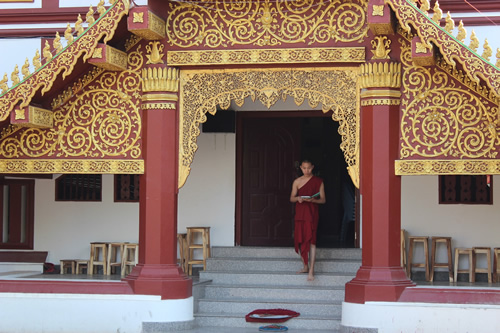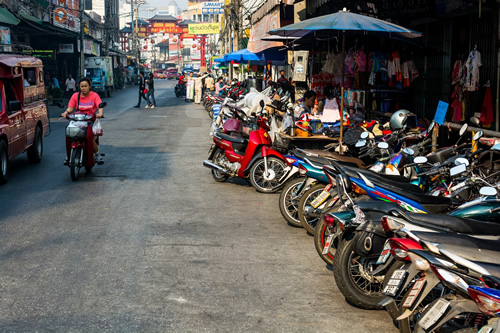English Teaching Jobs in Chiang Mai, Thailand
Why Teachers Stay Awhile
Articles and Photos by M.J. Young
 |
A temple in Chiang Mai. |
The walled city of Chiang Mai in northern Thailand has all the cultural benefits of Bangkok without the traffic and pollution. With bustling night markets, eclectic restaurants, jungle treks, nearby craft villages, and more than 300 temples (wats) it's understandably a popular tourist destination. But of the more than 150,000 residents, many are foreigners, so it is also an expat haven.
Do as so many others have. Settle in and stay awhile — get comfortable with Chiang Mai. You'll have plenty of teaching opportunities before you know it.
Settle In
For budget-minded travelers, transportation and lodging in Thailand is inexpensive — a simple room in a no-frills guesthouse ranges from 180-500 baht ($6-$15) per night depending upon location. Find a room where you feel comfortable and make it your home base while you ask around about apartments. A typical studio costs anywhere from 7000 to 13000 baht per month ($225 to $425).
The best way to find an apartment — or anything else you may need — is by talking to the locals. Get to know the people who are in your guesthouse. Go to the same restaurants day after day and chat with the owners. Thai people are very open and friendly and always willing to help, especially if they see that you intend to stay awhile.
Get Acquainted
While the central part of the city, or Old Town, is fairly easy to navigate because it's surrounded by a perfectly square moat, a maze of back roads and shortcuts lie within it. You'll need a motorbike to get around Chiang Mai, especially to get away from the tourist spots and into the nooks and crannies where you'll experience the real flavor of Thai food and a true sense of the culture. Rentals are available at agencies all over town for about $3.65 per day (new ones cost about $1,000 but can be sold fairly quickly with little decrease in value).
 |
Busy market in Chiang Mai with plenty of motorbikes parked nearby. |
Get a Job
Once you have transportation, visit every language school in town and leave a copy of your CV. Mention to everyone you meet that you're an English teacher looking for work. Leave your email address with any prospective student or employer and check your email often. Local Internet shops and guesthouses offer access for a small hourly fee. Most important, if you haven't heard from an employer in a week or so, go back for a follow-up visit in person and let them know you are still in town and still looking for work.
During the summer vacation for Thai students, March through May, teachers are in especially high demand as many parents send their children to summer school for English lessons. Arrive in February and you'll likely land a job before the summer break begins.
Start Teaching
Teaching materials can be limited, depending on where you teach, so it helps to bring along some resources of your own or tap into the Internet for fresh ideas (see boxout below). I worked at a small, private language school called Baanpasa. My students were mostly children, from age 3 to 13 (female instructors are often assigned to young learners, while males teach teens and adults). I taught around 15 hours a week at first, but as classes filled up and new classes were created, I was pulling in nearly 30 hours before the summer was over. In recent years, however, the average wage seems to have gone up to around 250 baht ($8) per hour more than enough to live on. Universities and larger institutions offer up to 30,000 baht ($1000) per month or more for a 1-year contract. Teaching private lessons is a great way to supplement your income, though it's not always reliable — students come and go depending on their schedules and level of interest.
Get Out and Explore
Aside from taking monthly trips to the Myanmar border with fellow teachers to get my passport renewed, we took motorbike excursions to the outskirts of town — Mae Wang elephant camp, the wood-carving village of Ban Tawai, an umbrella-making village called Bo Sang, and quiet forest monasteries.
M. J. Young was an English teacher in Chiang Mai and now works as an editor for several magazines in the New York-New Jersey area.
|
